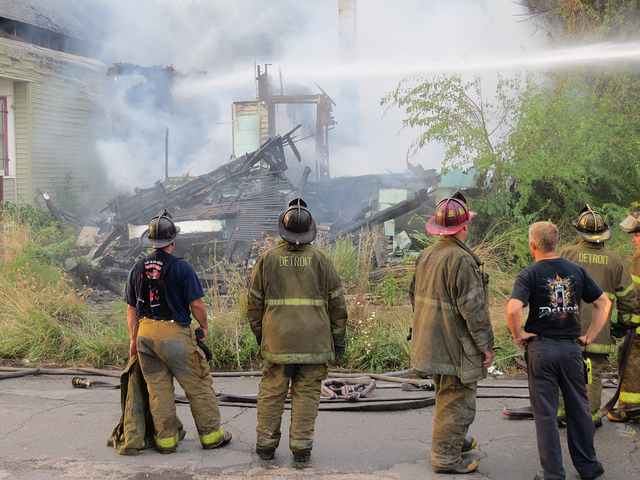Even fire services should withstand budget review, but good luck with that
During the federal dust-up over the budget sequester, President Obama took to the airwaves surrounded by firefighting personnel, even though firefighting is not a federal responsibility. When Michigan voters in 2012 had to consider whether to accept Canada’s offer to pay for and build a new bridge connecting the two countries, a series of ads argued that allowing the construction of the bridge would necessitate a reduction in firefighters.
In political science we refer to this as the “firemen first principle:” whenever taxpayers prove recalcitrant on revenue increases, threaten them with the elimination of firefighters. The public would do well to call the bluff.
Public myths are necessary to the sustenance of political order, but bad myths can undermine democratic decision-making. The worst are those which single out groups for special praise or vilification. I can think of no group in our society more affirmatively mythologized than firemen. They are lauded as heroes, their sacrifices valorized, and their sites of failure taken as sacred ground.
No traction can be made on state and municipal budgets without considering police and fire protection. At the same time, no two interests have been more adept at insulating themselves from budget cuts. When Scott Walker challenged the public employees unions in Wisconsin, he left police and fire departments alone. Michigan's "Right to Work" law provides an exemption for police and fire workers. These immunities have far more to do with political expediency than either principle or prudence.
The public has acquiesced largely because it accepts the myths. Take, for example, the widespread use of the misnomer "first responders." Events such as the Boston Marathon bombing and the World Trade Center attack demonstrate that the police and fire personnel are typically the last persons on the scene. Most of the hard work is done by those already there. If your house is on fire, you best get yourself and your family out. The main function of firemen (and it's a valuable one) is to contain fires, not to prevent or end them.
Actually, that's not true. Fighting fires constitutes a very small portion of a firefighter's tasks. Only 3.8 percent of the responses by Holland's fire department, for example, involved actual or suspected fires. With little to do and lots of down time, fire departments have been delegated other duties, such as installing car seats, this being beyond the skill set of the average taxpayer.
Long celebrated in movies, TV and the news media, the myth of the heroic fireman became even more deeply entrenched in public consciousness after the events of 9/11. It's not as if the New York Fire Department didn't have adequate resources. In the 10 years prior to 9/11 they received an increase in funding $253 million above inflation, even though the number of fires had declined by 46 percent in that same time.
Nonetheless, a combination of turf battles with the police department, bureaucratic mismanagement, and simple arrogance resulted in an inability to communicate during the crisis. The people who were saved in the towers were almost exclusively saved by people in the towers.
No person becomes virtuous by dint of wearing a uniform. William Langewiesche, in his book “American Ground,” claimed there were firemen looting World Trade Center stores while occupants were trying to escape the inferno. (This account was disputed.) Human beings are imperfect creatures, troubling mixes of virtue and vice, with a tendency, when the veneer of civilization gets stripped away, toward the latter. We do well to remember that rescue persons can be heroic, but are not always so. Indeed, they are typically no more so than the general population.
In a crisis, your best bet as a citizen is the people with whom you live and work. Government officials tend to be latecomers to a crisis. Given the viciousness of human nature, and given the unpredictability of life, these persons are needed. Deliberate decision-making, however, requires sound judgment concerning the relative value of public employees, replete with a sense of what's possible, and without illusion.
See what new members are saying about why they donated to Bridge Michigan:
- “In order for this information to be accurate and unbiased it must be underwritten by its readers, not by special interests.” - Larry S.
- “Not many other media sources report on the topics Bridge does.” - Susan B.
- “Your journalism is outstanding and rare these days.” - Mark S.
If you want to ensure the future of nonpartisan, nonprofit Michigan journalism, please become a member today. You, too, will be asked why you donated and maybe we'll feature your quote next time!


 A city with fewer of these folks? It might make sense, but it’s hard to get at the truth when the mythology of public safety is so pervasive. (Photo by Flickr user Sean Marshall; used under Creative Commons license)
A city with fewer of these folks? It might make sense, but it’s hard to get at the truth when the mythology of public safety is so pervasive. (Photo by Flickr user Sean Marshall; used under Creative Commons license)